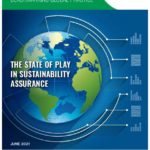In the wake of the Enron bankruptcy, policymakers have an opportunity to rethink the scope of information required by the SEC. Investors need information about a firms environmental and social practices and performance, as well as their profit performance. Through creative regulatory approaches, European governments are encouraging European companies to provide such "triple bottom line" information. According to a February National Policy Association (NPA) study, triple bottom line reporting has become the European way.
The report, The European Response to Public Demands for Global Corporate Responsibility by NPA Senior Fellow Susan Ariel Aaronson and NPA Research Associate James Reeves, found that European policymakers have developed a wide range of strategies to encourage both socially responsible investing and corporate social and environmental reporting. In July 2000, UK pension plans were required to declare whether and how they integrate social and environmental factors into their investment decisions. The success of this minor change to pension fund rules inspired the German government to approve similar legislation. France, Canada, and the SEC equivalent at the European Commission are also considering such rules. These rules have changed investor practices, and brought new investment to more environmentally and socially responsible companies.
Moreover, the study found that European executives did not find such reporting onerous. Many European executives believe socially responsible behavior may give them a comparative advantage in world stock markets. According to Reeves, "A move to triple bottom line reporting would not be onerous. Some 64% of multinationals already provide social and environmental reports on their Web site. The SEC can develop uniform standards as to how firms should compile and report such information, so that investors have a wide range of data to make good investment decisions."



